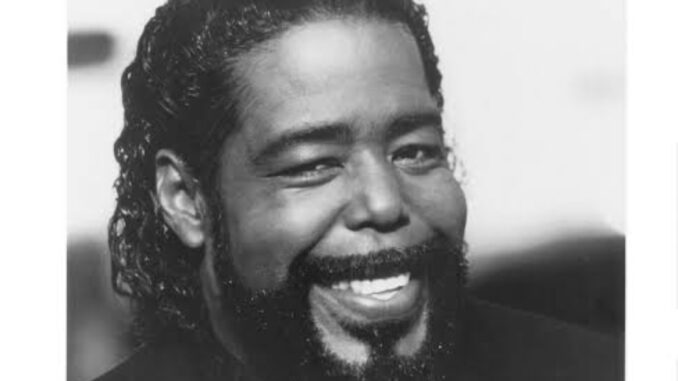
The Recording Academy is reportedly considering legendary soul singer Barry White for a posthumous Grammy Lifetime Achievement Award, according to industry sources close to the awards committee. This move, if confirmed, would mark a long-overdue recognition of White’s profound impact on soul, R&B, and popular music at large.
Barry White, who passed away in 2003 at the age of 58, was one of the most iconic voices of the 20th century. Known for his deep, resonant baritone and lush orchestral arrangements, White became a symbol of romantic soul music in the 1970s. His catalog includes timeless hits like “Can’t Get Enough of Your Love, Babe,” “You’re the First, the Last, My Everything,” and “Never, Never Gonna Give You Up.”
Despite selling over 100 million records worldwide and receiving multiple Grammy nominations during his career, Barry White never received the Grammy Lifetime Achievement Award while alive. Fans and fellow musicians have long considered this an oversight. The recent discussions by the Academy have reignited hope that the honor will finally be bestowed upon him.
The Grammy Lifetime Achievement Award is reserved for performers who have made outstanding contributions of artistic significance to the field of recording. Past recipients include musical legends such as Aretha Franklin, Stevie Wonder, and Michael Jackson—artists whose legacies helped shape the sound of modern music. Barry White, by all accounts, belongs in this pantheon.
Known affectionately as “The Maestro of Love,” White’s influence extended far beyond the charts. His unique blend of funk, soul, and disco helped define a generation of sound and inspired countless artists across genres. From hip-hop to pop, his music has been widely sampled, referenced, and revered.
His contributions also carried cultural significance. Barry White was one of the few African American artists of his era to achieve massive crossover success, bringing soul music into mainstream popularity across racial and national lines. His Love Unlimited Orchestra pioneered a lush soundscape that became a staple in romantic and dance music alike.
In addition to his recording legacy, White was a noted producer, arranger, and songwriter. He helped craft the sound of the Love Unlimited vocal group and contributed heavily to shaping the genre of quiet storm and sensual soul music. His deep musical understanding was matched only by his ability to connect emotionally with listeners.
Over the years, tributes to Barry White have continued to pour in from younger artists and musical veterans alike. From Beyoncé to Bruno Mars, many have cited White as an inspiration. The resurgence of vinyl and retro soul in recent years has also brought his work back into cultural conversation.
White’s family and fans have long championed the idea of honoring him posthumously. His widow, Glodean White, has expressed gratitude in the past for fans keeping his legacy alive, and she has previously supported efforts to petition for recognition of his contributions to music history.
If the Recording Academy proceeds with the award, it would not only celebrate Barry White’s undeniable talent but also correct an omission that has puzzled music historians for years. His music continues to enjoy a strong presence in radio, films, commercials, and streaming platforms, a testament to its enduring appeal.
Critics argue that waiting so long to acknowledge icons like White highlights the need for broader inclusion and diversity in how the Academy honors legacy artists. Still, the possible recognition—even posthumously—would be a significant moment for soul and R&B fans.
As the Grammy season approaches, the music world waits to see if Barry White will finally receive the Lifetime Achievement honor he so richly deserves. Whether in life or death, few voices have left as powerful a mark on music as the velvet-toned legend who sang straight to the heart.
Leave a Reply